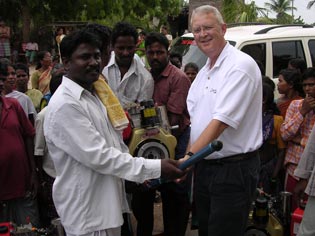 Three centuries before Salvation Army founder William Booth was born, German religious reformer Martin Luther struck a chord familiar to The Salvation Army's (TSA) worldwide work.
Three centuries before Salvation Army founder William Booth was born, German religious reformer Martin Luther struck a chord familiar to The Salvation Army's (TSA) worldwide work.
"Music is a discipline, and a mistress of order and good manners, she makes the people milder and gentler, more moral and more reasonable."
Little wonder, then, Salvation Army World Services Director Brian Burditt rarely skips a beat in, what may seem to many, an endless job of providing hope to millions of people in desperate communities around the world.
With a bachelor's degree in music and a master's in education, Burditt taught music in elementary and secondary schools for twenty years and played flugel horn in The Salvation Army Canadian Staff Band for ten years before taking on the role of Bandmaster in 1985, taking the band's message of music and hope to towns and cities throughout Canada, North America, Europe, Brazil and South Africa.
Since 2002, however, Burditt has focused his faith and energy on solving hunger, poverty, and deplorable living conditions throughout the world.
"There's so much attention on people's needs when a disaster like the Indian Ocean tsunami struck. And, that's absolutely necessary. And the Red Cross and Red Crescent can respond very quickly. They do a great job. But, we're in this for the long haul," Burditt says. "When the emergency relief workers leave, we're still there. In many cases we were already there. Our work is not the end; it's the means to the end."
Difficult to understand is the fact that many tsunami victims were poor before the tragic wave hit. Many, living under a still-practiced caste system, were marginalized; that is, trapped on the fringes of poverty, existing on the financial scraps of the local economy.
Along one Indian coastline, little aid was received because authorities deemed the region lightly affected, but the Army was able to determine that some 64 villages lost their entire livelihoods when the waves destroyed their fishing fleet. While the Indian government provided emergency response food, some 10-25 kilograms of rice per family, the help was not enough to sustain and restore these communities.
It was The Salvation Army that offered sustainable aid to 2,776 families with the building of some five hundred homes or other dwellings, repairing 186 fishing boats, replacing 62 others.
Brian Burditt looks to the people who live in the affected regions and his Salvation Army colleagues - the locals - for their views on what will work best for them. "This is not about imposing Canadian ideas. What will work best for local communities are the ideas that come from those communities," Burditt says. "Army staff make project assessments as to the viability of help projects. We don't just give money."
For World Services, viability means community help projects meet three important criteria: sustainability, integration, and capacity.
Like most of Salvation Army World Service projects, assessment teams comprising local community, local Army and World Services people determine whether the project will continue under its own power, without further aid, once completed. Sustainability.
The most successful aid projects are those well integrated with other communities and economies, providing benefits that reach out across village and social boundaries, extending benefits to many more.
Though considered a western concept, capacity is central to the long haul Burditt talks about. Simply stated, it's the ability to grow the enterprise, engaging more people in work for pay. More people with pay, more people living healthier and more rewarding lifestyles. "It's fine to dig a well and treat the water. That's always a good thing," Burditt explains. "But if the fresh, pure water can be used to clean crops and fish for market, more people enter the commerce chain. That's building capacity."
The Salvation Army provides many of the much talked about micro-credit loans, growing in popularity and success in poorer regions of the world. Generally, these small loans for self-help projects provide the seed money required to start a small community business. TSA micro-credit loans are most often given to women's groups in third-world countries to start businesses that will eventually employ other women, establishing a measure of health, wealth, and security for community families. Burditt says recipients repay one-hundred percent of the loan within two years. In situations where there is a modest interest rate, the accumulated interest is put back into the system to help others.
In many instances, Burditt's World Service work is very much about breaking the cycle of debt. For the wealthy or middle class in almost any country, debt is a car loan, a credit card balance, a home mortgage to be repaid from current and future earnings. For the poor, debt often means a loan to buy food for the children. Faced with a choice of money for food or money for education, food will always take first place. So, any helping hand that breaks the cycle of debt is opening the door to a brighter future.
Why do all this? On a recent trip to China, he was asked the very same question by some local government leaders, reminding him the Chinese government would never let The Salvation Army establish a church in China. "It's our mission. It's our ministry," Burditt told them. "We aren't here to preach or build a church. Our church is where ever we are. We are our church and our faith. The people of China see that and appreciate that. It's good enough."
by Peter J. Restivo